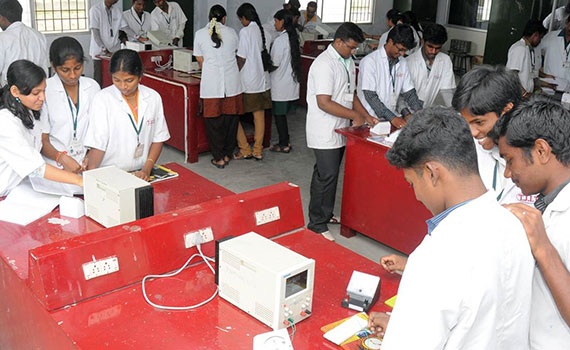

The Department of Electrical and Electronics Engineering in Thangavelu Engineering College was established in the year 1995. The demand for Electrical Engineers in industries, state electricity boards and private sectors engaged in electricity generation is more than the engineers available. The Department has excellent industrial relations and institutional interactions which provide services like consultancy, designing and testing.
To be a leader in educating, creating and graduating todays and tomorrow’s finest engineers. This includes investing in the intellectual and human capital of each individual student, focusing on both breadth and depth of knowledge in multidisciplinary and integrated education, and meeting the current and future challenges in electrical engineering.
Develop life-long learning skills that allow graduates to be adaptive and responsive to the changes in technology and the environment, as well as in career demands.
To provide the best and most unique programs in electrical and electronics engineering, and preparing its graduates to assume leadership roles and social responsibility.
The B.E. Electrical and Electronics Engineering was started in the year 1995. The periodical revision of the syllabi and introduction to electronics related subjects, enables the Electrical engineers to get acquainted with the latest developments in the Electrical and Electronics Engineering field and handle the present solid state electronic devices. Since the commencement of the program, the department has made sincere efforts in the development of students through training and industrial visits. The students from Electrical Engineering Department have won prizes in co-curricular and extracurricular activities.
PEO 1: To develop the ability to formulate, analyze, and solve electrical engineering problems by equipping them with the necessary knowledge and skills.
PEO 2: To be good citizens and cultured human beings, with full appreciation of the importance of professional, ethical and social responsibilities.
PEO 3: To foster an efficient program environment in order to encourage continuous self-learning and progress in career.
PEO 4: To provide necessary foundation to work in inter-disciplinary platform related to the respective field of engineering.
1. Ability to understand and apply differential equations, integrals, matrix theory, probability theory and Laplace, Fourier and Z transformations for engineering problems.
2. Ability to understand and apply basic science, circuit theory, electro-magnetic field theory, control theory and apply them to electrical engineering problems.
3. Ability to model and analyze electrical apparatus and their application to power system.
4. Ability to understand and analyze power system operation, stability, control and protection.
5. Ability to handle the engineering aspects of electrical energy generation and utilization.
6. Ability to understand and analyze, linear and digital electronic circuits.
7. Ability to review, prepare and present technological developments.
8. Ability to form a group and develop or solve engineering hardware and problems.
9. To understand and apply computing platform and software for engineering problems.
10. To understand ethical issues, environmental impact and acquire management skills.
The M.E Power Electronics and Drives course was started in the year 2011. To train competent engineers and professionals to meet the needs of industries related to power electronics and drives, power electronics applications in power systems, and the transportation sector. Power electronics devices and their applications. Software and information technology sectors involved in power electronics simulation studies and applications.
Placement in leading core companies like GE, TVS Electronics, Blue Star Infotech, BSNL Nokia, Texas instruments, Analog Devices, Honeywell, Tata Elxi, IBM and the like.
All R&D and Academic Institutions involved in R&D in the areas of Power Electronics Technology.

Adequate number of rooms for lectures, Seminars, Tutorials
The class rooms are exclusively allotted to 1st to 4th Year students for lectures.
The Optional Elective classes are engaged in the rooms available in the department.
Faculty uses instructional video CDs on the subject to teach the class.
Lecture rooms are equipped with LCD projector.
The Wi - Fi campus makes it easy for students to use on-line materials during presentations.
The Seminar and Smart Room is used for delivering technical Seminars and Project Review presentations.
The available Labs as per AU curriculum are supported by experienced Diploma holder technical staffs designated as Lab instructors. Out of the three staffs, one is an Engineering graduate in EEE and is pursuing M. Tech in Power Electronics and Drives under AU regulations. The departments and Labs in the institute work at times beyond the five working days for the benefit of the students.
The space for Project Lab is available in the vicinity of the existing EEE Labs. The department is gearing up to develop this Lab in the next semester.
It is also planned to use the Project Lab as Electrical- Electronic workshop for repairs and maintenance of meters, modules and instruments.